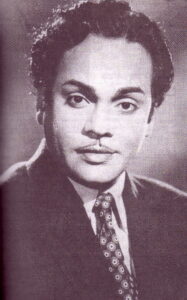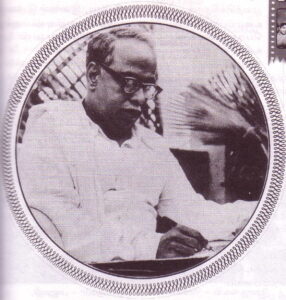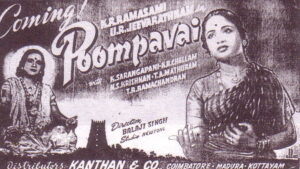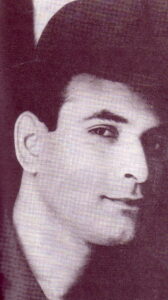The Singing Star of the ‘40s and ‘50s
by Sachi Sri Kantha, August 19, 2021

K.R. Ramasamy (circa 1950s)
The name Ramasamy had a good omen among Tamil cinema actors. According to my count, at least five actors carried this name. In chronological order of birth, they are ‘Pulimootai’ (Tamarind-sack) T.R. Ramasamy Aiyar (1912 – ?), ‘Friend’ Ramasamy (1914-1971), K. R. Ramasamy (1914-1971), V.K. Ramasamy (1926-2002) and ‘Cho’ Ramasamy (1934-2016). Among these five, four excelled in comedy roles. The exception was Kumbakonam Ramabatran Ramasamy (hereafter KRR), who was a singing hero, with an incomparable scintillating voice.
Unlike other four comedians sharing his name, KRR was a founder member of the DMK party. His 40th death anniversary passed by on Aug. 5. In this appreciation to KRR’s career as a singing star, I have assembled details about him, from three reliable sources – namely autobiographical memoirs of MGR, lyricist Vaali and a 1973 academic paper by Robert L. Hardgrave. It deserves mention that the guru of KRR’s political mentor Annadurai (Anna, 1909-1969), was also a Ramasamy – the atheist E.V. Ramasamy Naicker (1879-1973).
Unfortunately, a well-deserved entry is missing for KRR in the Encyclopaedia of Indian Cinema (1999), though two of his classic movies Velaikkari (1949) and Sorga Vasal (1954) had received entries due to their affiliation with Anna, who had scripted these. KRR’s influence to the development of Tamil cinema has been merged in Anna’s entry, as follows:
“His (i.e., Anna’s) debut, Velaikkari, inaugurated via its lead character, Anandan (played by K.R. Ramaswamy), the enduring convention of subjecting a poor hero to many travails, often seeing his family destroyed, until he stridently denounces his oppressors, often equating the gods with landlords as joint exploiters of the poor. Ramaswamy and MGR who was later named the ‘Makkal Thilagam’ (People’s Star), later became stellar figureheads of the DMK.”
Robert Hardgrave’s Impressions
American academic Robert L. Hardgrave (b. 1939) was one of the early contributors to the scholarship of Nadar community in Tamil Nadu and the origin of DMK movement. For his 1973 paper, Hardgrave had interviewed KRR in January 1970. He had stated the following:
“After the DMK was founded, Annadurai, E.V.K. Sampath, and K.R. Ramasamy, then Tamilnadu’s most popular actor and film star, staged dramas in benefit performances for the party. The DMK head office at Royapuram in Madras City was purchased with these funds.”
Then, in one paragraph, Hardgrave had described KRR’s career as follows:

Anna (circa 1950s)
“In 1949, with the founding of DMK, the actor K.R. Ramaswamy provided financial support for the struggling party. ‘Only with my earnings was the party founded,’ he says. He had met Annadurai through E.V. Ramaswamy, and it was his dramatic company which produced Anna’s first play, Velaikari. When the play was later filmed, K.R. Ramasamy was the star. At this time, Ramaswamy had reached the pinnacle of the Tamil film world. From his first film in 1944 (Poompavai, ‘Lady with Flowers’, directed by S. Punju), KRR rapidly became one of the most popular actors in South India. He could both sing and act – a critical combination before ‘playback’ and when a film might easily have thirty songs or more. Indeed, he was known by the title, Nadippisai Pulavar, ‘the Acting-Singing Poet’. With the ‘playback’ dubbed into the sound track, however, a popular singer could warble to the silent mime of the actor, and Ramaswamy began to lose out to rising young stars who had no need of singing talent. At about this time, in the early 1950s, personal problems brought his career to ruin. Later, in reward for his services to the party, Annadurai secured for K.R. Ramaswamy nomination as a Member of the Legislative Council, the upper house of the state government.”
One foot-note in Hardgrave’s study provided vital information on how Sivaji Ganesan received his break in 1952, to star in his Parasakthi debut movie. Hardgrave had interviewed the S. Panchu (aka Panjabikesan, 1915-1984), a member of Krishnan-Panju director duo, in January 1970. To quote the foot-note verbatim,
“Panju, director of Parasakthi, had wanted K.R. Ramaswamy, who was then getting about Rs. 40,000 per film, for the picture to ensure star attraction. Ramaswamy and Karunanidhi, however were at odds within the party, and Ramaswamy refused to act in the film. Annadurai suggested that Shivaji Ganesan be cast as the hero. Although he had never acted in film, Shivaji had been popular in Anna’s dramas. Punju signed Shivaji for Rs 250 per month – quite a bargain compared to what KRR would have commanded. S.S. Rajendran, a young actor associated with the Dravidian Movement, was also introduced in the film.”
Thus, the personality conflict KRR had with Karunanidhi (the script writer for Parasakthi) opened the path for Sivaji Ganesan to enter the cinema, via Anna’s recommendation.
Lyricist Vaali’s Impressions
I provide translated excerpts from a chapter in lyricist Vaali’s 1995 memoir below, which provides his interactions with KRR.
“From his early days, KRR associated himself with the Self-Respect movement and even in his movies, he had expressed the rationalism concept powerfully. In those days, one song which he had sung and acted in the Sorga Vasal [Heaven’s Gate] movie became controversial, for the lyrics written by Udumalai Narayana Kavi.
‘Aasthikam Ethu – Naasthikam Ethu? Arinthu solveere’ [What is theism? What is atheism? Will you tell me?]’was the line which irked the Censor board members, who chopped it. Later, it was softened to ‘Ahum neri ethu? Aaha neri ethu? Arinthu solveere’ [‘What is accepted rule? What is unaccepted rule? Will you tell me?’] for the movie. Still, that song thrilled our ears…

‘Poompavai’ (1944) movie poster
‘Poompaavai’ was the first movie which signaled the entry of KRR. [Note by Sachi: This movie, released in 1944, was the one in which KRR acted as the hero. His debut movie was Menaka in 1935.] If my memory serves, ‘Nam Naadu’ was the last movie he appeared. Between this period. Mr. K. R. Ramasamy had recorded his commendable acting talent and impressive singing talent. Nevertheless, it’s depressing that his achievements have been erased with time.
I tell the story of when KRR visited my home around 1970. MGR had told me that he wanted to act in a movie, produced with Mr. K.R. Ramasamy and Mr. Era Chezhiyan, as shareholding partners. Whenever I went to see MGR, KRR was also there and our friendship blossomed. We used to talk much under the tree shade of Vauhini Studio. After visiting music director Mr. S.M. Subbiah Naidu related to this particular movie in which MGR would act, he visited me.
I mentioned to him about a prevailing belief in Tamil – ‘One word will win; One word will kill’. I had mentioned to him, what I had heard that Mr. M.K.T. Bhagavathar spoke a line ‘I’m a convict’ in the ‘Valmiki’ movie, and the following day, he was arrested. Then, I asked him about that unfortunate line in one song he had sung for ‘Senthamarai’ (Red Lotus) movie, which turned out to be a curse word for him.
‘Paada maataen – Inimel, Paada maataen’ ‘[Will not sing – Hereafter (I) will not sing’] song. After that, he didn’t sing in any other movies.
KRR had acted in a movie ‘Thalai Koduthaan Thambi’ [Younger brother who offered his head]. But, for his song sequence, my dear pal Mr. A.L. Raghavan was dubbed for his voice. KRR listened to my thoughts and smiled softly! He neither agreed nor disagreed.

S. Balachander (circa 1950s)
The following week, KRR and I participated in the MGR Fans Conference held at Neyveli. He travelled in my car. During that journey, he dissected the Tamil cinema history, piece by piece. His stories about the strengths and weaknesses of so many pioneers in the field was so absorbing to me that I felt like a participant of finding treasures by the archives department. He spoke about many directors of yore. Raja Sandow, Rajah Chandrasekhar, T.R. Raghunath, Krishnan-Panju, M.L. Tandon, Murugadasa, K. Ramnoth, A. Kasilingam, K. Somu, H.M. Reddy. Suddenly, he asked me a question: ‘I would say that (Sundaram) Balachander was a pioneer who did change the face of Tamil cinema towards a new direction. What do you think? As his thoughts and my thoughts agreed, I confirmed his belief. He listed the movies directed by (S) Balachander, critiqued them and inferred that ‘Balachandar was a born genius’. Of course, I conveyed my support too. I realized how much respect he had for Balachander’s musical and directing talent.
I also told him about that particular movie, in which Balachander directed Sivaji Ganesan [Note by Sachi: it was Antha Naal (That Day), 1954; a rare Tamil movie, with no songs!]. Mr KRR did acknowledge my thoughts.
Then, our car was passing ‘Sethiyath Thoppu’. On the border of that village, KRR noted a Balachander directed movie, being shown in a touring theater. He called the driver to stop the car, and pulled my hands towards the theater telling ‘Vaali. Let’s watch this movie for a while’. I was worried that we would be late in reaching Neyveli function. He didn’t bother about it. Only after that movie ended, we continued to move towards Neyveli. I was surprised that KRR was silent, and didn’t talk about Balachander. ‘Anne! – why you seems silent now? I disturbed his thoughts. He responded sadly. ‘What an intellectual. He realized that Veena was important than cinema, and he quit Kodambakkam. When I think about it, I felt depressed.’ I could sense the sadness in his face on that twilight evening. That movie, Mr. KRR and I saw at the touring talkies, was ‘Avan Amaran’ [1958; He is immortal]. KRR and Mrs. Rajasulochana had acted in it.”
MGR’s Impressions
I provide translated excerpts from two chapters (30 and 31) in MGR’s autobiography (1970-72) below, describing the childhood days KRR and MGR spent at Madurai Original Boys Company in the 2nd half of 1920s. MGR wrote this around late 1970 in the Ananda Vikatan weekly. Born in April 14, 1914, KRR was 2 years and 9 months senior to MGR.
“He [i.e., KRR] was one of my favorite friends. If I had problems with others, he was the first to stand by my side. Mr. KRR called Kali N. Rathnam (their mentor) as mama. During those days, Mr. KRR had good body build with muscle too. Because of that, he was tagged as ‘Kattai Ramasamy’. But, boys couldn’t call him like that, because he was a bit rough minded.
He was asked to essay the role of Bharathan. As such, he had memorized the sections related to Bharathan scolding (his mother) Kaikeiyi. Two days before the drama was to be staged, Mr. (P.U.) Chinnappa was missing. Boss was worried. The following day, the drama had to be staged. Mr. KRR haven’t memorized the lines for that role.
Company’s boss had called Kali N. Rathnam and asked him to retrieve the notes given to KRR. Mr. KRR became upset with that. Though he didn’t ask for the role, the Company folks offered him the role and then prevented him from memorizing the lines.
After completing the assignments in Tiruchi, we moved to Palakkadu…After 15 days when the drama was staged, the scene manager Parameswaran came looking for me and told me that Rathnam had asked me to be present. I was not told the reason, though I had inquired many times.
I was taken to the drama cottage. There I saw Mr. KRR rehearsing the Bharathan role in front of Mr. Rathnam. When I went, Mr Rathnam asked me, ‘Are you willing to take the Bharathan role?’ I couldn’t understand. I looked at Mr. KRR. He told me secreted, ‘I couldn’t memorize the lines entirely’. I told, I’ll act. Then, as I had memorized all the lines, I was able to present it fully. As such, that night it was decided that I play the Bharathan role.
It was decided by Mr. Rathnam that KRR and I alternate the Bharathan and Satrughnan role daily.
The next day, when I went to the company grounds, I saw the boss sitting in front with a cheroot. I was scared. Not only me, all others felt like it. I cannot tell any reason for it. When he saw me, he asked – ‘Who is rehearsing inside?’ I went in and observed. Mr. KRR was rehearsing the Bharathan script in loud voice. Then, I returned and responded to the boss. He had some doubt. He asked me, ‘Who played the Bharathan role last night?’ I replied, ‘It’s me’. ‘Then, why should Ramasamy rehearse the role?’ I replied that the decision was made by Kali N. Rathnam. He asked me to call Rathnam and I obeyed his order. While the boss and Rathnam were conferring, KRR asked me, ‘What’s the issue?’ I answered him, and both were listening to the talk between the boss and Kali N. Rathnam hiding behind the door.
Boss: ‘Hey, why you are rehearsing Ramasamy? Didn’t Ramachandran do the role well?’
Kali N. Rathnam: ‘Of course’ he did it well. But, in case if he had a sore throat, as an insurance, I’m preparing Ramasamy as ell.’
Boss: ‘Why go to such a trouble? In 10-15 days, Chinnasamy (Chinnappa) will return! For this, why we need two boys?
Rathnam had to return, without contradicting the boss.
KRR looked at me repeatedly. In a few days, I could understand the meaning of that look. He had misunderstood that I’m the one who had gone to the boss to demand the Bharathan role for me, and only after that, the boss had called Kali N. Rathnam for a talk, to tell him that there was no necessity for ‘Ramasamy to rehearse the role’. Not only K.R. Ramasamy, even Kali N. Rathnam also thought like that.
From the way K.R. Ramasamy behaved with me since then, I could grasp this hurt feeling. Due to unexpected opportunity to play that coveted role, my close friend K. R. Ramasamy turned into a rival.
Our friendship was not an ordinary one. We got along so close. Both of us would sleep in the same mat. We discussed acting, other drama world news secretly between us. When he smiled, my lips would smile. When his eyes blurred, my eyes also blurred. But, that particular incidence turned out to be testing time for our friendship.”
Few pages later, MGR also had described a similar rivalry between KRR and him, for the role of sage Narathar. While the company boss had asked MGR to pick up the Narathar role, KRR had went to trainer Kali N Rathnam to ask for the same role, and the trainer had agreed to it. The trainer got angry with MGR, thinking that MGR had demanded the same role and received the approval from the boss. Though, in reality, it was the boss who had asked MGR to pick up the role. One could say that MGR was at the right place at the right time, when the boss made decisions. As KRR had lost out to MGR twice, MGR had written that KRR had ran away from the drama company, without telling others. Only after a month, Madurai Original Boys Company folks came to know that , KRR had joined a rival company – that of T.K.S. Brothers’ Balashanmuganantha Sabha, and was rewarded with important roles (i.e. heroine roles) for him to make his grade. MGR had ended his KRR episode with the lines, “Somehow we were pleased to learn that such a change in K.R. Ramasamy’s career at that time brought him a refreshed appearance, fame and good life”.
End Notes
Final three movies of KRR, in which he appeared in minor roles were that of MGR’s – Nadodi (1966), Arasa Kattalai (1967) and Nam Naadu (1969). Sadly, he wasn’t offered a singing opportunity in any one of these movies! Thus ended KRR’s movie career of 34 years.
An explanatory note: as mentioned in lyricist Vaali’s memoirs above, Senthamarai movie, in which KRR’s song ‘Paada maataen – Naan Paada maataen’ was released only in September 1962. But, this movie was in production for so many years. As such, it could be assumed that this particular last song of KRR was recorded well before 1958; for the S. Balachander directed-movie ‘Avan Amaran (1958)’, Sirkazhi Govindarajan sang a duet with Jikki, [Vaanmathi Nee Arivaai song] for KRR’s character. And another subsequent movie ‘Thalai Kodutthaan Tambi’ (1959), A.L. Raghavan sang a duet with Jikki [Kathaikathaiyaam Karanamaam song] for KRR’s character.
As indicated by the compilers of the Encyclopaedia of Indian Cinema, it should be stressed that KRR functioned as Anna’s gifted magical wand, in exploiting the then new cinema medium towards his politics. He acted in Anna-scripted trend-setting movies – Velaikkari (1949), Oor Iravu (1951), Sorga Vasal (1954) and finally in Ethaiyum Thangum Ithayam (1962). The bad blood KRR had with Karunanidhi, made him to reject the opportunity to star in Karunanidhi-scripted Parasakthi (1952) movie, which facilitated Sivaji Ganesan’s entry into the Tamil cinema. Simultaneously, I also wish to highlight an uncomfortable fact that unlike Anna’s trait incorporating talents of diverse kinds to his fold, Karunanidhi carried a defective gene that antagonized almost all the talented stars (MGR, Kannadasan, KRR and S,S. Rajendran) who flocked to the DMK party and supported it with their funds.
As KRR was strongly affiliated with Anna, following Anna’s death in Feb 1969, it could be said that with the rise of Karunanidhi, KRR lost his mooring, partly due to his addiction to liquor. After falling for cancer, KRR breathed last on August 5, 1971.
After KRR’s death, it was MGR who helped his family. As recorded by his daughter to a feature in the Hindu newspaper in 2014, “ KRR’s daughter Kalaiselvi remembers how her marriage was arranged. ‘MGR called my mother, he had broken away from (the DMK) party by then. He assured her that he would take care of everything and did so too. He arranged my marriage with Kalaivanar’s (NSK’s) son, and even took care of all the expenses. My mother, thereafter, joined his (Anna DMK) party. After MGR’s death, her close association with V.N. Janaki continued.”
Three Super songs of KRR
Anna wrote the script of the original drama, in one night itself, to promote the Krishnan Nadaga Sabha, managed by KRR. It was subsequently made into the movie Oor Iravu (One Night) by AVM company. Though 70 years had passed now, KRR’s song Enna Ulagamada (What’s this world?) written by K.P. Kamatchi Sundaram, and the four minutes of cinematography of S. Maruti Rao (1921-2000) for the movie which accompanies the song is indeed a timeless beauty.
The Youtube link for this song is Oor Iravu – Enna Ulagamada Song – YouTube
Another song of KRR with a lilting rhythm where he sells sweets in the road appeared in the movie Neethipathi (The Judge, 1955).
The Youtube link for this song is K R Ramaswami song in Neethipathi 1955 – YouTube
There is also a rare-duet song KRR sang with T.M. Soundararajan for the T.S. Balaiah character, in the same movie Neethipathi. For this song, KRR appears as a woman in sari, and T.S. Balaiah was ‘eye’ing this woman. The Youtube link for this song is TAMIL OLD–Uruvam kandu en manasu(vMv)–NEEDHIPATHI – YouTube
Sources
Hardgrave R.L.: Politics and the film in Tamil Nadu; The stars and the DMK. Asian Survey, Mar 1973; 13: 288-305.
Ashish Rajadhyaksha and Paul Willemen: Encyclopaedia of Indian Cinema, new revised edition, Oxford University Press, New Delhi, 1999, pp. 44, 316, 338-339.
M.V. Raman: The man who started the trend. The Hindu, Sept, 20, 2014.
MGR: Naan Yean Piranthaen (Part I), Kannadhasan Pathippagam, Chennai, 2014, 401-422.
Kavignar Vaali: Naanum Indha Nootraandum (This Century and Me), Kalaignan Pathipagam, Madras, 1995, pp. 300-306.
Vamanan (aka K.N. Krishnaswamy): Thirai Isai Alaigal, part 1, 2nd ed., Manivasagar Pathippagam, Chennai, 2004, pp. 216-225.
What a great piece of history! I would have never known that KRR was a founding member of DMK and DMK could not have survived without his financial support. As usual Karuna is the real life villain here too and MGR is the hero in real life too helping KRR family after his demise!!